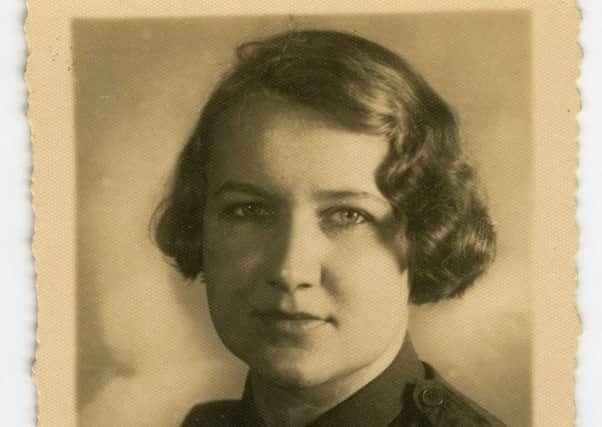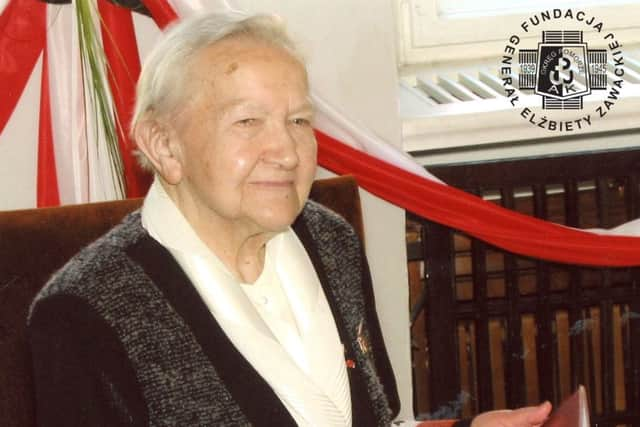The Silent Unseen was made up of hundreds of specially trained Polish soldiers '“ but just one was female


Yet, 70 years ago, Levenmouth and the East Neuk provided the base for brave Poles who had escaped occupied Europe.
And if the Cichociemni is not well documented, it is no surprise the incredible story of Elżbieta Zawacka has only recently come to light.
Advertisement
Hide AdAdvertisement
Hide AdNot only was she a paratrooper, she was the only female member of the elite unit who trained at Largo House.


Largo House, now in ruins and hidden by trees, nearly 70 years ago was the hub for training Polish troops in preparation for an assault on the German army in Europe.
The story of how a woman in her 30s came to be in Fife, thousands of miles from her wartorn homeland, is fascinating.
Born in 1909, Elżbieta was involved in the paramilitary organisation Female Military Training – which trained Polish women to act as soldiers in the event of war – before World War Two, becoming an instructor and commanding in Silesia in southern Poland.
Advertisement
Hide AdAdvertisement
Hide AdOn August 31, 1939, 24 hours before Germany began its blitzkrieg invasion of Poland, she was called up as part of the general mobilisation.


Explaining why Elżbieta was so desperate to fight for her country, Dr Katarzyna Minczykowska, historian at the General Zawacka Foundation, said: “She believed even in the hardest times that Poles should stand together. That is why later she never emigrated, even though she had opportunities to do so.”
Elżbieta fought in Silesia and Lviv, before acting as a courier, transporting letters and documents around Europe.
In 1943 she travelled to the UK for more training, including for a night-time parachute jump. For that, she travelled to Fife.
Advertisement
Hide AdAdvertisement
Hide Ad“In Largo House she underwent the parachute and secret intelligence training,” Dr Minczykowska explained.
“Moreover, she trained candidates to join the Silent Unseen in the field of underground activity in Poland.
“She taught them how to work in the underground, what conditions they could expect to encounter in occupied Poland.”
Elżbieta returned to Poland on the night of September 9, 1943.
Advertisement
Hide AdAdvertisement
Hide AdDr Minczykowska said: “She came back to her underground service in the Home Army, where she organised the intelligence service and the Home Army structures in Silesia.
“In 1944 she fought in the Warsaw Uprising. After its fall, she was trying to reconstruct broken communication with Polish military and civilian authorities in exile.”
Sadly, the end of the war did not mean the end of Elżbieta’s battles.
In 1951 she was arrested, and served three years in prison, for a claim she had helped the Polish government in exile, which was not recognised by the Polish Government and the Soviet Union.
Advertisement
Hide AdAdvertisement
Hide AdIn 1976, Elżbieta, who was by then a university professor, visited London to do research work for the Polish Underground Movement Study Trust but on her return to Warsaw, she was arrested again and forced into early retirement.
Elżbieta dedicated her remaining time to commemorating former soldiers of the Home Army and was a co-founder of the World Association of Soldiers of the Home Army.
In 1990, an archive was set up, later becoming the Elżbieta Zawacka Foundation, which promotes research into the activities of the Home Army, and the military service of Polish women.
Dr Minczykowska said: “In Poland after World War Two, the communist authorities did everything it could to make people forget about people like Elżbieta.
Advertisement
Hide AdAdvertisement
Hide Ad“When Poland regained independence, people started talking about the heroic deeds of soldiers of the Home Army, including General Elżbieta Zawacka. In 1995, President Lech Wałęsa decorated her with Poland’s highest order – the Order of the White Eagle.”
Decorated and honoured, and finally recognised for her contribution with over 60 medals, Elżbieta Zawacka died on January 10, 2009.